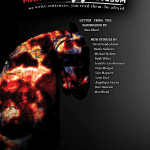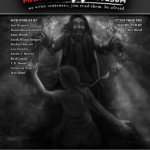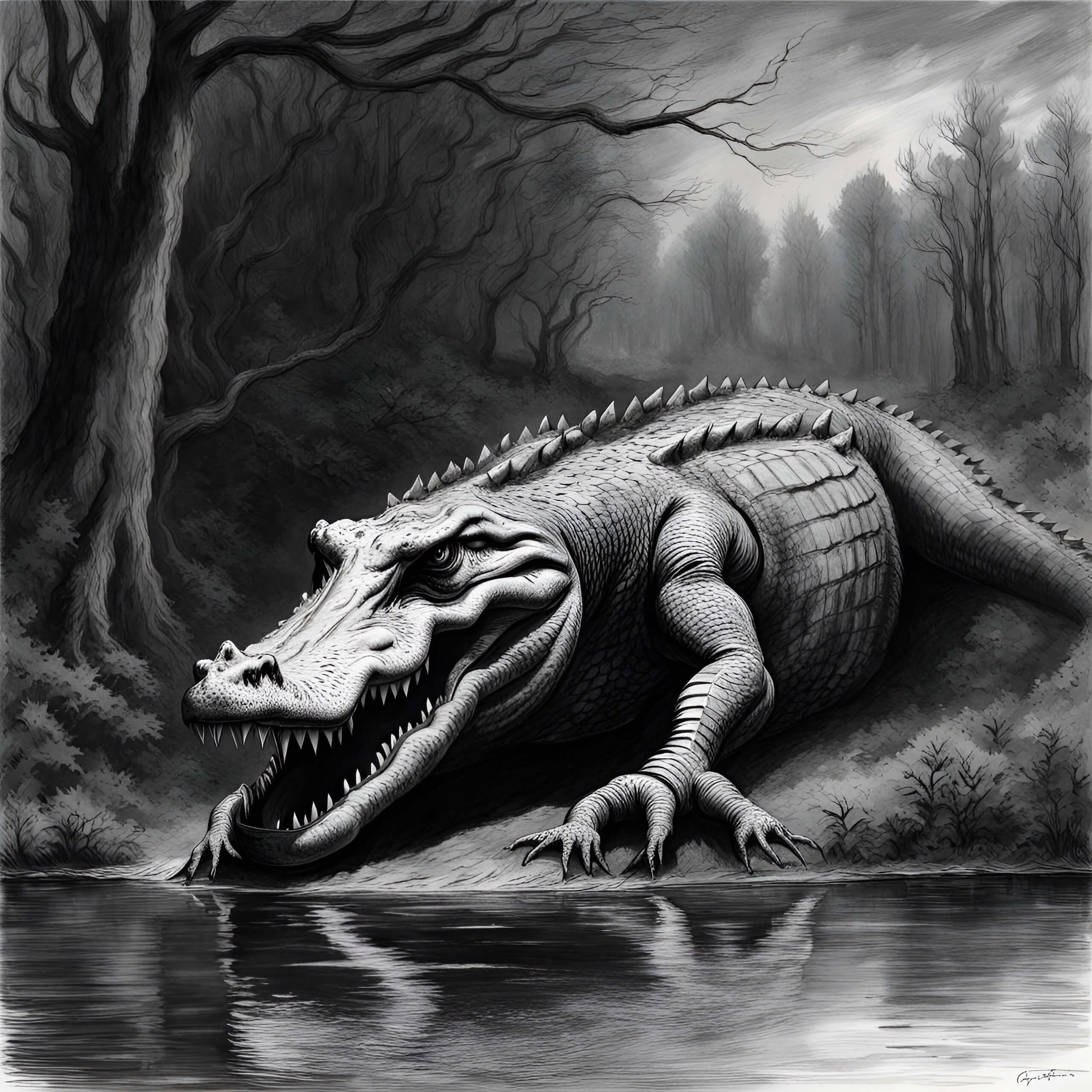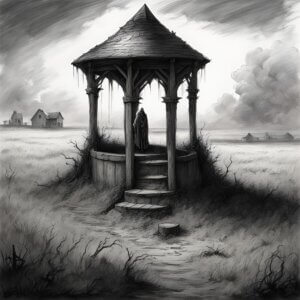The first stage of the evacuation order seemed to go smoothly.
Three elderly couples waited patiently on a wooden deck while a care-giver wrangled their luggage. The gentlemen wore lightweight grey suits and the women sported knee-length print dresses with modest bits of jewellery. They were cheerful and cooperative, as if traveling to a favourite grandchild’s wedding rather than a local hotel to wait for flood waters to recede.
A muscular, tight-lipped young woman in a white polo shirt pushed a cart-load of suitcases towards them.
Officer Schmidt had lived in this neighbourhood for several years but was completely unaware of the sophisticated little retirement compound that had been constructed below the embankment of the river. Several cabins were intermingled with common areas, all elevated on a massive, irregular cedar deck. Apparently, there was once a putting green on a beautiful lawn that sloped towards the water but that landscaping was now obscured by the soupy brown overflow.
A futuristic outdoor elevator provided access to a parking platform at the top of the embankment. “The power’s still out,” Officer Schmidt said, glancing over his shoulder at the glass tube. “I’ll help lug suitcases up the stairs, Krystyn.” The care-giver hadn’t introduced herself but Schmidt had snuck a peek at her ID card, which also revealed a company name: Komplete Kare.
Krystyn bent down so that a key on her neck lanyard could be fitted into a stainless-steel slot. “They have their own generator,” she said to the policeman as the elevator whirred to life. Glass doors opened and she maneuvered the cart inside. “I’ll be right back,” she assured the couples. The elevator’s lift mechanism, two gigantic pistons, extended gracefully. The platform rose twenty feet and Krystyn exited from the opposite-side door.
“Is Krystyn a nurse?” the officer asked.
“Of course,” one of the ladies answered.
“But much more than that,” a male companion added. It was difficult to tell exactly how the six individuals were paired up. Unlike most elderly couples, these people weren’t latched onto a specific partner, they kept shifting positions. “She also maintains the lawn.” He looked sadly at the muddy water lapping at the deck pilings. “Well, everything’s submerged, now. But we had world class croquette and lawn bowling between those beech trees….”
The elevator returned to the lower deck, glass doors eased open and Krysten pulled the cart back towards the cottage complex.
“Listen,” the officer said, “you folks seem to be very well-organized, but I’ve been instructed to ask this question once again, just as everyone is leaving.” Six heads turned towards him obediently. “You’re positive you haven’t left any pets behind?” As the words left his mouth, he thought he heard a scratching sound underneath the deck.
“Oh!” one of the ladies raised a hand, but a companion quickly grabbed her arm and whispered something in her ear.
“Those arrangements were all made earlier, officer,” Krystyn said as she re-approached the group.
“But thank you for asking.” The ladies smiled tightly and the men bobbed their heads. “It’s so considerate.” All six residents, and their care-giver, boarded the elevator.
Officer Schmidt skipped up a broad set of iron stairs at the very end of the deck and reunited with the group as they were being handed into a Limousine van. Their luggage was loaded into the covered bed of a king cab pickup. Both vehicles and their drivers carried the Komplete Kare logo.
One of the ladies poked her head out of the van window. “Do you really think we’ll be gone for three weeks?” She smiled sweetly at Schmidt.
“This isn’t a normal, weather-related flood,” the officer explained, again. “The dam upriver has been breached and you lost a hundred feet of backyard over night. You can’t return until repairs are completed, and I have no idea how much work will be required.” Privately, he wondered if the hundred-year-old structure was salvageable. Anything constructed on the ancient floodplain might be washed away by tomorrow morning.
Krystyn looked at her watch. “Time to leave,” she said, and waved as the residents pulled out of the parking pad. “I still have to fetch a couple of laptops,” the care-giver told Schmidt. “I use the cabin at the far end of the deck as my office.” She moved towards the elevator.
“Wait a minute,” the policeman said. “What’s the deal with these people? I live just a few blocks away and never knew this little riverside paradise existed.”
“Well, the complex is completely self-contained. The residents don’t get out much, but they seem perfectly happy with that. The middle cabin even has a salon chair so the ladies can get their hair done.” Her eyes made glancing contact with Schmidt’s. “They had a similar set-up on the banks of a Florida canal a number of years ago.”
Krystyn’s demeanor had softened, slightly, now that her charges were safely stowed, so Schmidt kept talking. “And what’s with the sign?” The officer pointed to a cedar slab arcing above the glass elevator doors. Letters were carved into the wood and blackened with a torch so they could be more easily read: “Beaver view Lodge.”
“What about it?”
“I don’t want to seem juvenile…” Krystyn’s expression became rigid again, but the cop pushed on, anyway. “You know, beaver is sort of a euphemism for vagina…”
“They’re Canadians,” Krystyn interrupted. “When they lived in Florida they proudly advertised the fact with that sign. It was important to their group identity so they had it shipped here.” She flexed her shoulder muscles in a menacing way. “I don’t think the ladies are flashing their vaginas around.”
Schmidt was embarrassed. “I just wondered if it was an honest mistake on their part.” He shrugged, sadly.
Krystyn turned towards the brown ribbon of water. “Until yesterday, there were three beaver lodges on the opposite river bank, and every evening the animals splashed around at the edge of their property.”
Schmidt nodded.
“If it makes you feel any better, about half of those aquatic rodents had vaginas.” Krystyn got on the elevator.
The policeman watched her descend in the glass tube, and scratched his head awkwardly. “I shouldn’t have mentioned it.”
The next stop in the evacuation protocol was much more problematic. Eight dented aluminum trailers were parked on a little island a half mile from Beaver View Lodge. A very different group of friends had established their own insular community there, but it was one that didn’t include lawn bowling greens or salon chairs. In the nineteen sixties, it might have been considered a noble communal living experiment.
An orderly removal was clearly impossible. The camper vehicles had long ago lost their wheels, and anyway, the causeway to the shore had been washed out. None of the residents could afford hotel rooms, and they were reluctant to vacate land that was only theirs because they were squatting on it.
Officer Schmidt tried his best to convince them. “There’s no guarantee that the coffer dam on the reservoir will hold. If the spillway ruptures again you might have an eight-foot wall of water rolling through these flats. Your boats and trailers will be washed away, and you’ll all die in your sleep.”
“I’ve gone upriver to check out the repairs,” a man named Gary said. He seemed to be the spokesperson for the group. “The dam itself is fine, it’s just the spillway mechanism that broke. I think they’ve got things under control, now. The army has set up a command centre there, for Christ’s sake. They won’t allow a catastrophic failure, it would be too big an embarrassment.” Other campers nodded their heads soberly. Schmidt thought it odd for this group of iconoclasts, or social misfits, or whatever they were, to have such faith in a government institution.
“There are no children here,” a woman named Gracie pleaded. “We know that staying is a calculated risk, but we’re willing to take it.”
They argued for half an hour, then Officer Schmidt admitted defeat. “Okay,” he said, “you win. But please do me a favour.”
Various campers nodded.
Officer Schmidt pulled a handful of indelible markers out of his jacket pocket. “Would you please write your names on your bodies with one of these pens?” He passed the Sharpies around. “This is supposed to be a scare-tactic to convince you folks to evacuate, as if we’ll be identifying your floating corpses within a couple of days. But if I can take cellphone pictures of the new body-art, they might accept your decision and won’t try to forcibly remove you.”
“I can write my name on my dick if you like.”
“I was hoping for an upper arm. You know, roll your sleeve up and look at me over your shoulder for that Rosie-the-Riveter vibe.”
The campers liked the suggestion. “This is actually empowering,” one of the women said.
After the photo-record was complete, officer Schmidt shook hands with everyone and said he hoped they wouldn’t have to see each other again.
Further downstream, past the town, Schmidt inspected a half dozen fishing cabins, but they had already been closed down for the season. The officer posted notices on the doors anyway, and wrapped some orange police tape around dock posts.
Emergency repairs to the dam did, in fact, hold through the night and by early morning a construction barge had arrived so army engineers could begin driving pilings deep into the river bed to support the aging structure. With each hydraulic hammer blow a permanent solution to the breach seemed increasingly likely.
The first body appeared just before lunchtime, floating onto the margins of the washed-out Credit Union parking lot. The remains were gruesomely disfigured: head, fingers and toes had all been sloppily removed and every wound trailed squid-like scraps of skin. It was still possible to identify the corpse, however, because the person had thoughtfully written her name neatly on the left arm, just below the shoulder.
Officer Schmidt was ordered to meet two homicide detectives in one of the operating rooms of the new hospital. The story of the failed evacuation had quickly circulated around the department, including Schmidt’s sharpie gambit. That was never part of his official instructions, he’d stolen the idea from a news story about a hurricane rescue operation in the Carolinas and was surprised that it ended up having real practical value.
“There’s very little decomposition,” the doctor said. He would start the autopsy as soon as the policemen left. “I’ve seen these wounds, before, though. Common snapping turtles scavenge dead prey in this manner, and for some reason they devour the head first.” He frowned. “It usually doesn’t happen until the body becomes putrid, however. Perhaps the flood has stressed the animals.”
“So, this person wasn’t killed by having her head chopped off?”
“We’ll know for sure in a couple of hours, but I’d be willing to bet she drowned.”
Back at the police station, Schmidt made a report for the homicide detectives, including the time-stamped cell phone photo he had taken of the woman just the previous afternoon. When that was done, he offered to ferry the detectives to the campsite to conduct interviews.
“Uhh.” The two detectives were clearly reluctant. “We’ve seen the size of that crack beside the spillway,” one of the men said. “I don’t mean to sound insensitive, but I’m not going to risk my life to take a statement about an accidental drowning.”
His partner nodded. “I think they’re going to deliberately let the dam fail.” His voice dropped an octave. “You know, it was never intended to be a reservoir, that just sort of happened. The thing was originally built to dry up the marshes in Port Maitland.”
“Yeah. People used to think swamps were unhealthy.”
“But now, people are clamoring for natural wetlands. It’s not in the government’s long-term interest to repair the dam.”
Schmidt was vaguely aware that the Springe River Conversation Authority had questioned the necessity and practicality of maintaining a hundred-year-old dam, but hadn’t realized the issue had morphed into a well-defined conspiracy theory.
“Listen,” one of the detectives said, looking intently at Schmidt, “you seem to have developed a pretty good rapport with those hippie weirdos. If you’re comfortable with the army’s safety assurances, you can conduct the preliminary investigation.”
“It would be heroic on your part, and believe me, we’ll point that out to everyone in the department.” They smiled like vacuum salesmen but Schmidt had the twin human failings of vanity coupled with poor risk assessment, so he agreed.
The official police rescue craft floated like an obedient pet, lashed to a willow tree near the public launch. The concrete ramp and most of the parking area were now submerged, so Schmidt had to wade through knee deep water to retrieve it. He drove the boat slowly upriver towards the campers. The tailstock of the motor kept striking debris that had been loosened during the initial reservoir breach and the policeman eventually had to adjust the tilt mechanism allowing the outboard to bounce upwards whenever it hit something especially large.
When he approached the campers’ island, the entire group seemed to be intently watching his approach. “This is about Gracie, isn’t it?” Gary said as the launch bottomed out on a muddy hump.
“We found her body this morning,” the policeman said and one of the women started to sob loudly.
“We knew she was missing last night, and tried to call you.” Schmidt had handed out cards with his personal contact information. “But our cell service has disappeared.”
The policeman was invited ashore and they walked to a storage container that had been converted into a communal kitchen and workshop. Gary handed him a coffee and insisted on an unedited description of Gracie’s body. Afterwards, Schmidt listened quietly while the others planned a funeral ceremony to release Gracie’s spirit. The fate of her physical body wasn’t addressed and the policeman didn’t want to appear insensitive by asking about it. There was no need for Schmidt to be officious in order to generate a report, everyone was eager to relive Gracie’s last hours of life. She had been setting night lines at the downstream end of their shrunken island after most of the others were asleep. Since the flood had radically altered the terrain, everyone assumed she had slipped in the newly unfamiliar world, and suffered a head injury. Schmidt put his notebook away and the group left the container.
“That’s where it happened,” a woman said, pointing to a gigantic Maple trunk that was half hidden by the flood. “She was going to walk to the end and tie some cat fish lines to that last branch.”
Schmidt took several cellphone pictures.
“I guess I should pull in my fish traps,” a man named Winston said.
Gary placed a hand on his shoulder and squeezed, but didn’t say anything. Winston sighed and squelched away through the mud in a pair of pink flip flops.
Officer Schmidt took a couple of steps towards his launch and accidentally brushed against a stringer of animals that were suspended between two small trees, awaiting cleaning. “Jesus,” he said, and stepped away. The headless body of an eight-foot black rat snake was draped over the wire. A turtle, roughly the shape of a shoe box, was skewered through the beak with a metal hook. And there were three lizard-like creatures Schmidt had never seen before. Those bodies were brown with a sparse pattern of large yellow spots. From flat nose to stubby tail, they might have been two feet long. “What are those things?”
“Salamanders. They sometimes show up in our fish traps.” Gary pointed to a large basket formed from tangled dogwood branches. “We make them ourselves.”
“I thought salamanders were tiny little things.”
“Some are.” Gary paused. “These aren’t.” The man clamped his jaw and chewed on his grief. The policeman knew it was time to leave. He placed one foot in the bow of his boat, shoved it free, then tottered back to the stern to lower the motor.
Schmidt carefully backed away from the island camp then shifted into forward gear and puttered towards the river center. A long, black object appeared directly in front of him. The policeman assumed it was a log until he tried to circumvent it by veering back towards the island and the black shape moved against the current to stay in front of him.
The thing was large, perhaps eight feet long, but it was hard to tell exactly because the colour of its body mingled with dark striations in the water. It had far too much mass to be a snake, even a specimen as large as the one hanging from the wire in the trailer camp. It wasn’t a family of minks or beavers swimming in formation because the line visible on the surface was ruler straight, not undulating.
And then the shape disappeared.
For a while, there was a trail of bubbles, but those soon dissipated as well. Schmidt continued to watch, extrapolating where the creature might be heading. The policeman saw Winston, thigh deep in a pocket of flotsam, coiling a rope around his fore arm. A basketball-sized orange buoy floated at his side and a wicker fish trap was visible on shore, a few yards away.
“Winston…” It wasn’t a warning, the policeman simply wanted to ask the man about the odd-shaped animal. Canadian waterways weren’t like the canals of Florida, where you had to be wary of predators.
Winston disappeared.
The man looked up at the sound of his name, his eyes became wide for an instant and then he dropped straight down, without a splash. His legs must have been pulled out from underneath, but the action was so quick and strong that there was no opportunity to struggle or even cry out. Schmidt initially gunned his motor to reach the gentle eddy marking the man’s disappearance but the prop instantly bit into something soft, then stalled. The policeman was terrified that he had somehow run over the victim and tilted the motor up. Some black goo slipped off the blades not, thank God, clothing or pink flesh. Schmidt unwrapped a few strips from the shaft and dropped them into the bottom of his boat. He decided to leave the engine up and use his safety paddle to maneuver the boat forward but that just ensured he would arrive too late to be helpful.
When the policeman alerted the campers, they launched their own flotilla of flat-bottomed fishing boats and poked the recently flooded areas with sticks but without success. Much later, the orange buoy was recovered on the opposite bank, wedged underneath some willow branches, but Winston’s forearm was no longer entwined in the coils.
Officer Schmidt reported the missing man to a coastguard detachment at Port Maitland. They promised to search for the body, but their cooperation was conditional on a safety report from the army engineers working on the reservoir dam. No one with a government pension was eager to work downriver from the fragile concrete structure.
Once his paperwork was completed, Schmidt sat at his desk, tapping his front teeth with a pen.
Suddenly, he opened his laptop and entered the phrase “Beaver View Lodge” into a search engine.
The policeman had experienced a momentary flash of insight as he saw Winston slip below the surface of the water and he needed to test it.
Of course, Schmidt expected to receive an onslaught of amateur porn as he typed in the phrase, but that wasn’t the case. Instead of being tempted to peruse old Hustler photo-spreads the officer was invited to participate in virtual tours of rustic cabin complexes.
Was he the only person in the world who immediately thought of genitalia when he heard the word “beaver”? His computer was technically owned by the Ormond Regional Police force, so maybe their IT department had installed a program to filter out the dirt.
It took a while to focus the search parameters, but Schmidt eventually found what he was looking for: several newspaper stories about a small group of Canadian snowbirds in a Florida gulf coast retirement community.
The oldest article was an innocent human-interest piece about senior citizens who treated canal gators as pets, feeding them panfish like you might toss peanuts to chipmunks. It was accompanied by a bizarre photograph of an elderly lady flipping a blue gill into the giant maw of an Alligator floating a few feet from the manicured margin of her lawn. A wooden sign emblazoned with the words “Beaver View Lodge” was visible in the background. The brief article explained that three couples had unofficially adopted the shy creature, named him “Samson,” and trained him to respond to the sound of a plastic bird whistle. The woman’s face was slightly obscured, but Schmidt recognized the surnames, Pepp, Hoover, and Arsenal from the evacuation orders he had served in Ormond, just a couple of days ago.
A second article described the near fatal alligator attack on a teenaged boy employed to cut the lawns of Beaver View Lodge. Apparently, his mower had stalled and he was clearing gouts of heavy wet grass from the blades, while whistling happily. Samson lunged out of the water, grabbed the young man by the ankle and dragged him back into the canal. When the alligator started its death roll, the young man’s running shoe shredded and he was ejected from the whirling jaws.
A third article described a law suit launched against the members of Beaver View Lodge. Feeding alligators was a misdemeanor violation of statute 372.667 and the Canadians were accused of willfully endangering their community by eroding the animal’s natural repugnance for humans.
The members of Beaver View Lodge had insulated themselves against litigious neighbours by purchasing a generous umbrella insurance policy. The three couples moved back to Canada, leaving a corporate lawyer to negotiate a settlement. The case was expected to take years and Schmidt couldn’t find any information about a resolution.
The policeman sighed.
As part of his report to the Ministry of Natural Resources Schmidt included links to the Florida Beaver View Lodge articles, as well as the coroner’s report on the first victim. He mentioned that there was a remote possibility that a beloved pet alligator had been transported north from a Florida canal and accidentally released by flood waters into a southern Ontario river. There were two suspicious deaths on the Springe, and Schmidt officially requested the ministry to investigate. Then Schmidt emailed his supervisor—he couldn’t bear to articulate the bizarre theory over the phone—and explained that he was about to interview a trio of elderly evacuees and ask them if their Florida luggage had contained a large specimen of lethal fauna named Samson.
On his way to the hotel, Schmidt stopped for a coffee and periodically checked his phone, giving his supervisor ample opportunity to pull the plug on his mission. But without an official countermand he was obliged to exercise his own poor professional judgment. Schmidt anticipated a year of office pranks.
The Pepps, Hoovers and Arsenals had been installed in three adjoining ground floor suites in the Hyatt Exemplar. Officer Schmidt found them all in the central unit playing bridge and cribbage, laughing, and drinking red wine. Krystyn the Komplete Kare giver was in the suite as well. It wasn’t clear what her official function was, since she seemed to be reading a fitness magazine.
Schmidt re-introduced himself, apologized for having to ask an awkward question and begged for their indulgence. He couldn’t even raise his eyes, but he informed the group that he was aware of the Florida negligence lawsuit. He told them of the two recent mysterious river deaths and finally asked if they happened, by any chance, to have brought their pet Samson with them when they moved to Ontario.
The question was met with absolute silence. Schmidt wasn’t sure what he expected to hear, perhaps laughter or incredulous outrage, but this non-response was unsettling. He tilted his eyes upwards. All seven people, including the nurse, were frozen in a guilty tableau. Mouths and eyes were unnaturally broad circles, and upper bodies had stiffened like the trunks of spindly, wind-deformed trees.
“Uh… your reactions lead me to believe I may have stumbled on the truth.”
There was a long pause before Mrs. Pepp volunteered an explanation. “Oh no, dear. We didn’t bring the poor animal here. You see, Samson was murdered. One of the neighbours was incensed by the… the incident… and whistled to draw him on shore then blew his lower jaw off with a fifty-calibre rifle.”
“The poor thing managed to swim away, but he bled to death and his body was dragged out of the canal a few days later.” Mr. Hoover continued the story. “Those morons cut up his body with shovels. We couldn’t stay there after that.”
Mrs. Pepp reached into her purse and pulled out a yellow plastic bird whistle, shaped like a log. She placed the fluted end in her mouth and blew. A little plastic bird perched on the log twirled his wings and produced a yodeling song. The three couples bowed their heads as if they had just heard “The Last Post” at a Remembrance Day ceremony.
“Well…” Officer Schmidt had trouble formulating a follow up question.
“It’s Delilah,” Krystyn said. She had lowered her magazine to join the conversation.
Schmidt rubbed his chin. “Is Delilah another alligator?” he asked tentatively.
“Oh no, Dear,” Mrs. Arsenal said. “We’ve learned our lesson with that particular species. Delilah is a giant salamander.” She pursed her lips as if suddenly considering something. “I suppose it’s possible that someone may have mistaken her for an alligator. She’s six feet long and weighs more than a hundred pounds. And, of course, she’s aquatic…” Her voice trailed off.
“Excuse me a minute,” Officer Schmidt said weakly as he felt his phone vibrate. “I’ve got a call.” It was a message from the Ministry of Natural Resources that read: “Alligator theory asinine. Stop watching so many movies.” And in brackets, an addendum that must have referred to the coroner’s report: “no puncture marks on the victim.” He replaced the device in his pocket.
“Here’s a picture.” Krystyn was hunched over her phone, scrolling through a series of images. She stopped, made an adjustment and passed the instrument to the policeman.
At first, it was hard to tell that the black blob on the screen was a living thing. It looked like a giant mound of outdoor hobo shit. But after a period of adjustment, Schmidt could see tiny eyes like broken marbles set above the corners of a flat semi-circular mouth and a pair of malformed front legs. A pair of attractive red pumps planted on neatly trimmed grass provided some scale. The animal seemed to have a decorative bit of orange ribbon on the top of its head.
“Could you send me that?” Schmidt asked. Krystyn’s thumbs generated the command. “By the way, what’s the point of the little bow.”
“That’s a tag,” Mr. Arsenal said. “Everything we’ve done is above board. We rescued the animal from a shady private zoo and we’re in the process of getting her transferred to a breeding program in Dallas.” He rubbed his nose. “We’ve learned our lesson,” he said, “From the Florida thing. All above board.”
Schmidt composed a reply to the Ministry’s email. “Sorry about mentioning gators,” he wrote, “but the people involved in my investigation did keep one as a feral pet. I’m currently interviewing them and they have just admitted to owning a giant fucking salamander (see attachment). Could that thing drag a person under water? Regards.”
He received an almost immediate reply: “Giant salamander theory not nearly as stupid. Those things actually like cold water and have some cachet as exotic pets. Of course, we would need to examine the animal to see if jaw line matches abrasion on victim. Hugs and kisses.”
“Listen,” the policeman said, while putting his phone away, “you didn’t let Delilah go for little swims in the river, did you? Then whistle when it was time for bed?”
“Oh no.” Hands waggled defensively. “We’ve learned our lesson. Delilah was kept in a forty-foot fenced pond underneath the cottages.”
“She needs lots of shade.”
“But part of her enclosure extended beyond the deck. She needs a certain amount of sunlight to regulate her body temperature.”
Schmidt didn’t recall seeing any sort of fence poking out from the end of the deck. Muddy river water had covered everything to the height of the floor boards. “The part of the cage that extended past the deck…did that have any sort of lid?”
There was a suspicious pause. “Of course, it did,” Mrs. Pepp said. Her lips pressed so tightly together they seemed to disappear. “I’m just not one percent positive that I closed the latch after we said goodbye. I went last.”
Schmidt didn’t know what to say. He couldn’t imagine any meaningful exchange with the black blob in the photograph.
“I’m very sorry,” Mrs. Pepp said. Mrs. Arsenal squeezed her arm.
“Excuse me,” Schmidt said. He had a text from his duty officer. It read: “Jesus. We’ve got an environmental disaster on our hands that might kill dozens of people. Don’t start yammering on about killer alligators or we’ll look like idiots.”
Schmidt typed a reply: “Already feel like asshole for mentioning alligators. But it wasn’t that far-fetched (see email chain). However, have determined that giant fucking salamander is probably roaming the lower river. Check out picture and tell me you won’t have nightmares.”
send
The reply was almost immediate. “Previous email was perhaps a little hasty. I meant to say congratulations on a brilliant investigative effort. Could you go back to that hippie compound and see if they’re motivated to evacuate now?”
Schmidt discovered another body while he was attempting to untether the police launch. This victim wasn’t human however, it was a black, malformed, prehistoric-looking giant newt with a deep propeller gash in its neck. An orange ribbon, pinned to an ulcerous fold of skin above the left eye meant it was Delilah.
The policeman glanced into his launch and saw the black scrap of filth that had clogged his motor earlier that day. He collected it in an evidence bag. Then he slid a blue vinyl tarp under the giant salamander and dragged it out of the shallow water onto the parking lot. He let the water drain away, and bent over the corpse and sniffed. It didn’t reek yet.
Schmidt bunched up the blue tarp to create a handhold and dragged the salamander behind his cruiser. He took the shotgun and body armor out of the trunk and placed them in the back seat. Then he twisted the tarp around both his wrists, squatted down, and managed to heft the soggy lump just high enough to slide it into the trunk.
He emailed the Ministry of Natural Resources again: “Accidentally killed giant salamander with my outboard motor. Hopefully, God will cut me some slack given his own record of flood-related collateral damage. Disgusting animal corpse will be in the morgue room of Ormond General (the new one).”
The reply was swift and sarcasm-free: “A biologist is on his way.”
After the salamander-delivery, officer Schmidt resumed his earlier mission. He left the trunk of the cruiser open in the parking lot because he had badly misjudged the dead animal’s lack of odor.
The river current seemed a little stronger as Schmidt drove upriver to the trailer camp. Maybe the engineers were closing in on a final solution and relieving some pressure on the structure in preparation for an ultimate repair.
Schmidt could see the campers, lining the shore as if waiting for him when he approached. There was a pile of gear stacked behind them. Schmidt’s launch bottomed out and he leapt onto the bank. He could tell their situation had deteriorated even further.
“What’s the matter?”
“We lost another one. Amy. She was canoeing to the bank so she could drive into town for supplies. We have a truck parked in a turnout, a hundred yards or so down that logging road.” Gary took the policeman to the opposite side of their little island and pointed out the swampy patch of water now separating the camp from shore. “It flipped her boat over. We only heard a bump, no screaming or thrashing. No body.” Schmidt took some more cellphone pictures. The canoe was visible down river, upside down and tangled in the branches of a wild cherry tree.
“When did it happen?”
“Earlier this morning.” Schmidt sadly realized that this third attack happened after he had run over Delilah. Perhaps the motor blow hadn’t killed her, just made her angry enough to upend canoes.
Gary looked down, apologetically. “You were right. We should have left when you first talked to us, in fact we were just about to paddle to shore. But frankly, after what happened to Amy, we’d feel safer in your launch. Can you ferry us to the town side?”
The most direct path to the city was across the flooded river to the deck at Beaver View Lodge. Schmidt placed four people in his launch and carried them to the platform. Four more people went in a second trip. Gary remained behind to help load the boat with knapsacks full of clothing and camping supplies. It took two additional passages to transport the belongings. The policeman called their social services contact and an Anglican Priest soon showed up with a fleet of vehicles to transport everyone to an emergency shelter set up in his church’s basement.
The campers solemnly shook hands with Schmidt. Gary pulled up the sleeve of his T‑shirt to reveal his name in indelible marker printed on the shoulder muscle, and rubbed it gently with his thumb. “You think you know what you’re up against,” he said sadly. “I thought it was just water.”
Schmidt was a little puzzled by the campers’ fatalism. He didn’t want to mention his own misapprehensions, giant salamanders and alligators, but he thought the campers would be more interested in assigning blame. They seemed strangely detached. “Aren’t you curious about the thing that attacked three members of your group? Do you wonder what it was?”
“Oh, we know what it was.” Gary said emphatically. Officer Schmidt just stared blankly, so the camper continued. “It was Gigoon.” Several of his group nodded sagely.
“I beg your pardon?” The word sounded vaguely First-Nations, perhaps it was the name of some vengeful sprite.
“I think the word is Ojibwe,” a lady said. “Loosely translated, it means ‘giant fucking blue catfish.’”
“It was swept out of the spillway plunge pool by the first rupture, and it’s angry.”
Schmidt didn’t know how to respond. The campers had retreated into a world of myth to explain the tragedies. The policeman couldn’t be too critical, however, after promoting a transplanted Florida Alligator as the culprit.
Officer Schmidt climbed back in the department’s rescue craft, driving back to the public boat launch when he heard an air raid siren. It had been installed as part of a security system in the early nineteen fifties when people were paranoid about Russian sleeper agents blowing up their dam. The only time it had ever been sounded was a week ago when the spillway opening partially collapsed.
Officer Schmidt looked back over his shoulder, but the river seemed unchanged. A moment later there was an additional frenzied howl from the siren.
As those harsh vibrations dissipated the policeman became aware of an odd rustling noise. He looked back again and saw a large willow tree pitch forward into the water. A crescendo of snapping and crackling sounds were created by a wall of debris being shoved between the muddy banks of the Springe River. The mass appeared to be moving slowly, like a train in the distance, but the policeman knew it was an optical trick.
Schmidt gunned his motor.
There must have been another rupture at the dam.
The first breech had been relatively small, but even that minor failure had filled the flood plain of the river to absolute capacity. Additional water would wash over the banks and through the town itself.
Schmidt looked over his shoulder again and saw a tangled black and green ridge just a football field to his stern and gaining rapidly. The leading edge of the flood seemed to be enormously high, and roiling with shore vegetation that had been scoured loose.
Schmidt turned into the flooded greenspace containing the submerged boat ramp and beached the police launch in the parking area. Then he jumped out of the boat and lumbered to the only highpoint within sight: a piece of elevated playground equipment shaped like a pirate ship. The officer scrambled up some rigging, flopped on the pressure-treated deck and grabbed onto a decorative ship’s wheel just as a moaning brown swell completely engulfed the park.
Schmidt heard his cruiser make a “Harumph” sound as it was swept towards the washroom building. There was a fantastic amount of human detritus mixed in with the mat of reeds and tree branches. Several bar-b-ques clattered against the stanchions of the play-ship, Styrofoam bait containers littered the brown surface like snowflakes and there was an inexplicable flotilla of shoes.
The flood crested at the deck of the pirate ship then retreated somewhat as the water explored a network of creeks and runoff ditches and filled some low-lying soy bean fields on the opposite bank. The park was a vulnerable space because its clay banks had long ago been excavated to create a waterfront play area. When Schmidt finally decided it was safe to climb back down the pirate rigging, he had to wade a hundred meters through a waist-high swamp to reach dry pavement.
Officer Schmidt’s investigation of the earlier river deaths was put on hold for almost a week while various low-lying buildings were secured and searched. Officially, four people had died as a result of the second dam failure: two army engineers on the construction barge and a homeless couple who were sleeping underneath a low-slung railway trestle down river. It was impossible to be absolutely certain of the casualties. The homeless couple were a surprise because they hadn’t shown up on the original evacuation census. Their bodies were found wedged into interstices of the bridge’s I‑beam structure, but others might have been washed into Lake Ontario. The three campers were listed as victims of the first breach, although important details, like the fact they had been dragged to their deaths by an aquatic creature were not publicly mentioned.
When Schmidt finally finished his report, some official information replaced speculation. The original victim, Grace Kline, had indeed drowned after being dragged under the surface of the water. A gently curving welt on her calf indicated that she had been grabbed by something. The Ministry of Natural Resources biologist said the giant salamander wasn’t responsible. The bite pattern indicated Gracie had been attacked by something with a much larger mouth and a dissection of the salamander proved it hadn’t even scavenged the corpses. And based on analysis of the scrap of flesh retrieved from Schmidt’s prop spindle, he had killed the salamander before the third victim, Amy Wright was attacked.
Winston and Amy’s bodies were recovered in the Credit Union parking lot, within a few yards of each other, tangled in a wire fence after water from the second breach receded. Autopsies demonstrated that they had drowned, but the corpses were too badly damaged to yield evidence of the thing that had grabbed them.
Schmidt made another visit to the elderly residents of Beaver View Lodge. They were busy poring over maps, scouting out potential locations for the next iteration of their compound.
Krystyn, the nurse and gardener, seemed to be part of the decision-making process so she may have been planning to move away with the three couples.
The policeman had two pieces of news to deliver. One: Delilah the salamander wasn’t responsible for any human deaths. And, two: he had personally run over the animal with his police launch, severing its spine.
The three couples were incredibly relieved that their pet hadn’t killed anyone, and didn’t seem overly concerned that Delilah had been mutilated by a boat propeller.
“Pets are such a bother,” Mrs. Arsenal said, shaking her head with a tight quivering motion that could have been an involuntary palsy. Schmidt noticed a large terrarium on a side board. He didn’t inspect it closely, but at a distance it appeared to be full of gigantic spiders.
Krystyn accompanied the policeman to the door and extended her hand to shake.
“Listen, Krystyn, I don’t mean to be intrusive, but I’ve been thinking about your business branding.” He risked brief eye contact. “Krystyn’s Komplete Kare. Your logo is KKK, and I wondered if that was an unintentional mistake…” His voice trailed away uncertainly.
“Like Vagina View Lodge.”
“Yeah, I guess.” Schmidt rubbed the back of his head.
“It was deliberate,” Krystyn said. “The Ks are within a baseball. It’s supposed to represent a pitcher striking out the side, the epitome of excellent performance.” She tilted her head. “Your world view seems to be a little dark.” She closed the door but the policeman saw her thin smile, like something swimming just below the surface of a pond.
A week later, the policeman received an email from the Ministry of Natural Resources biologist who had performed the autopsy on Delilah. He was passing along some new information related to the Springe River deaths. A man on a salmon fishing charter on Lake Ontario had hooked a gigantic blue catfish while trolling the dark edge of the runoff cloud from the Springe river flood. The email included two pictures of the beast. One was an underwater shot provided by a camera attached to the boat’s sonar beacon. It showed a tiny human hand clutching the gill plate of the enormous fish. The animal’s broad mouth was open, as if it were deciding whether or not to speak, revealing a sparse set of long, needle-like teeth. The second picture was taken by a drone flying at the side of the charter boat, and it showed a dark flat line more than six feet long just barely breaking the surface of the water.
The biologist suggested that this very catfish was the most likely killer of the three campers. He speculated that it had been living in the plungepool of the dam spillway, like a piscine Henry the eighth, gorging itself on spawning salmon and sedentary carp until it had achieved an estimated weight of one hundred and sixty-five pounds. The initial dam breach had displaced and disoriented it and the second failure had washed it right into Lake Ontario.
The biologist speculated that Grace Kline’s calf might have fit between the widely spaced, snaggled teeth, and that was why there were no puncture marks on her corpse. The giant fish had snapped the fisherman’s tough braided line soon after it was brought alongside the boat, so an autopsy of the animal wasn’t possible. It would have been interesting to see if its stomach contained the undigestible remains of Winston’s plastic sandal.
Schmidt immediately recognized the similarity between the giant catfish and the monster Gary called Gigoon. Schmidt had assumed the campers were talking about a local legend, but maybe they were referring to something they had actually seen. They might have noticed a spectacularly large catfish near the dam spillway but fishing within one hundred meters of a dam is technically poaching, and that might have made them reluctant to speak more plainly.
Officer Schmidt wanted to ask Gary about it directly so he contacted the Anglican priest who temporarily housed the campers. Unfortunately, that group had already moved out, having brokered permission to build a new camp on the margins of a cattle farm on the Grand River. Gary, their leader, remained in Ormond because he had cut his hand on a shopping cart while assisting with the community clean up of the park that contained the playground pirate ship.
Schmidt drove to the Ormond general hospital to interview Gary, only to discover he had died that very morning.
In a world full of alligators, giant salamanders and colossal catfish Gary had been killed by a tetanus germ weighing less than a trillionth of a gram. His death was eventually included as part of the final flood-related toll.Officer Schmidt submitted a final report to his supervisor and then drove home. His neighbourhood had been shielded by a particularly high section of riverbank, and was undamaged. The policeman deliberately altered his route so he would pass by Beaver View Lodge, and he happened to see Krystyn and one of her employees perched atop stepladders removing the distinctive wooden sign. Presumably it would accompany the three elderly couples to their new location, where ever that might be.
Mark Thomas (he/him) is a retired English and Philosophy teacher, and ex-member of Canada’s national rowing team.












